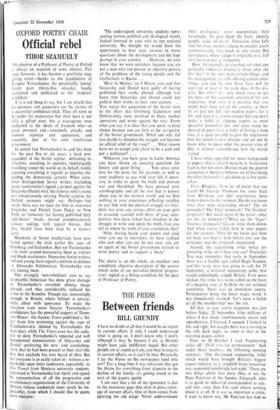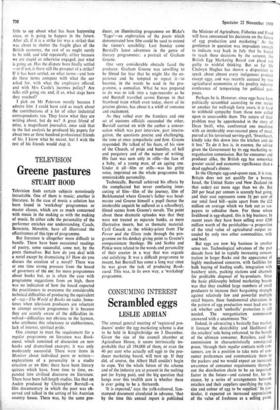Between friends
THE PRESS BILL GRUNDY
I have no doubt at all that I would be an expert in current affairs if only I could understand what is going on. I don't know why I don't, although it may be because I am, as Hamlet might have pid, indifferent stupid. But other people are as stupid as I am, and they're experts in current affairs, so it can't be that. Personally I lay the blame on the newspapers (and why not? For a long time it was television that got the blame for everything from alopecia to the decline of the family; it's getting round to the turn of the papers again).
I am sure that a lot of my ignorance is due to the enormous gaps that exist in press cover- age of current affairs. One of them comes from ignoring the old adage 'Never underestimate their intelligence: never overestimate their knowledge. So give them the facts, identify people, make all plain.' Television often falls into this trap: pundits talking to pundits aren't communicating very much to very many. But newspapers. whose adage it originally was, fall into the trap just as frequently.
How, for example. do you find out what any particular industrial dispute is about after the first day? If the men want certain things, and
the management are only offering certain other things, you can he sure those facts will be
reported. at least in the early days of the dis- pute. But after? It's very much rarer to get the bases of the argument articulated for our inspection. And since it is possible that you might have been out of the country, or been ill, or just not felt like reading papers for a
hit: and since it is almost certain that you don't make a habit of clipping papers, as most specialist journalists do; and since many in- dustrial disputes have a habit of lasting a long time, it is quite possible to gain the impression that the nation is near disaster and yet not to know why; to know what the present state of play is without remembering how the match started.
I have often appealed for more background in papers: that is what I mean by it. Sometimes I get it; but not often. Having made the general accusation it therefore behoves me (I love being therefore behoved) to get down to a few parti- culars.
First. Rhodesia. Now we all know that our friend Mr George Thomson has come back from Rhodesia and that negotiations have broken down for the moment. But do you know what they were negotiating about? The six principles? The 'Tiger' proposals? The 'Fearless' proposals? But much more to the point—what are the six principles?'What are the 'Tiger'- 'Fearless' proposals? Go on. write them down. And when you've failed, look in your papers for the answers. Then let me know just how far back you had to look before you saw the principles and the proposals enunciated.
Second, the engineering strike (what en- gineering strike, do 1 hear you say? Precisely). You may remember that early in September there was a fearful ogre called Hugh Scanlon, and this nasty man was going to call, for 23 September, a national engineering strike that would undoubtedly cripple Britain. Even more wicked, the strike was to be called on the basis of a majority vote of 31-30 by the AEF national committee. There was an immediate outcry. Participation being the latest magic word, it was immediately invoked. 'Let's have a ballot of all the membership' was the cry.
All that, in case you've forgotten, was just before S-day, 23 September. Like millions of others I was made simultaneously aware and apprehensive. I listened, I opened, I looked to left and right, but naught there was a-stirring in the still, dark night, or come to that in the morning papers either.
Then on 20 October I read 'Engineering strike off : 29-23 vote for postponement.' And under those headlines the following opening sentence: 'The threatened engineering strike which would have brought Britain's biggest export industry to a standstill from tomorrow was suspended indefinitely last night.' There are two things about that story. One, it was by Peter Paterson of the Sunday Telegraph, who is as good an industrial correspondent as any; and two. since then I've read almost nothing about it at all. If it was so important a strike, I want to know why Mr Paterson has had so little to say about what has been happening since, or is going to happen in the future. After all, if it is a strike (or was a strike) that was about to shatter the fragile glass of the British economy, the rest of us ought surely to be told, and told repeatedly, either because we are stupid or otherwise engaged, just what is going on. Has the dispute been finally settled —or if not, is there still the prospect of a strike? If it has been settled, on what terms—and how do these terms compare with what the /LEP asked for, with what the employers offered, and with Mrs Castle's incomes policy? Are talks still going on; and, if so, what stage have they reached?
I pick on Mr Paterson merely because I admire him. I could have said as much about the contributions of a lot of other industrial correspondents too. They know what they are writing about, but do we? A great friend of mine, a magnificent journalist, once said that in the last analysis he produced his papers for about two or three hundred professional friends of his. I know what he meant, but I wish the rest of his friends would stop it.



































 Previous page
Previous page